

A recipe for homemade deodorant that REALLY works! 13 baking soda uses to clean almost everything. We also know baking soda is in many of our favorite recipes.
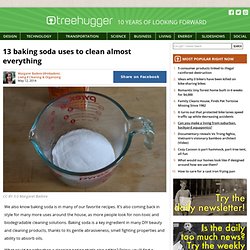
It’s also coming back in style for many more uses around the house, as more people look for non-toxic and biodegradable cleaning solutions. Baking soda is a key ingredient in many DIY beauty and cleaning products, thanks to its gentle abrasiveness, smell fighting properties and ability to absorb oils. What could be safer than a cleaning potion that’s also edible?
Below, you’ll find a round-up of ways to use baking soda to clean everything from a clogged drain to a greasy head of hair. 1. Drano is really toxic stuff, and you don’t have to take our word for it—just read the warning labels on the back of the bottle. 2. Homemade Borax-Free Dishwasher Detergent. InShare I have tried many different “eco-friendly” dishwasher detergents over the years.
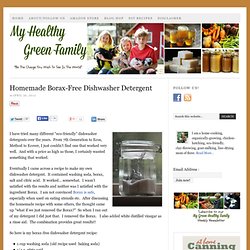
From 7th Generation to Ecos, Method to Ecover, I just couldn’t find one that worked very well. And with a price as high as those, I certainly wanted something that worked. Eventually I came across a recipe to make my own dishwasher detergent. It contained washing soda, borax, salt and citric acid. So here is my borax-free dishwasher detergent recipe: 1 cup washing soda (old recipe used baking soda)1/4 c. citric acid1/4 c. coarse salt10-15 drops of citrus essential oil (Optional.
Mix first 3 ingredients well in an air tight container. Miscellaneous Bulk Ingredients – Mountain Rose Herbs. Aloe Vera Gel This incredibly stable Aloe Vera Gel with a pourable consistency is highly beneficial for dietary, cosmetic, and household use.
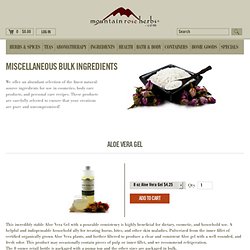
A helpful and indispensable household ally for treating burns, bites, and other skin maladies. Pulverized from the inner fillet of certified organically grown Aloe Vera plants, and further filtered to produce a clear and consistent Aloe gel with a well rounded, and fresh odor. 6 Homemade herbicides: Kill the weeds without killing the Earth.
It's been said that weeds are just plants whose virtues have not yet been discovered, but if you're tired of waiting to find out what those virtues are, you might want to use one of these homemade herbicides instead of the chemical versions.
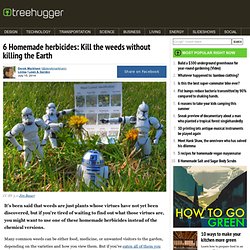
Many common weeds can be either food, medicine, or unwanted visitors to the garden, depending on the varieties and how you view them. But if you've eaten all of them you can, and you still need to get rid of weeds in your yard, it's far better for you, your soil, and your local waterways to choose a more environmentally friendly herbicide than those commonly found in the home and garden center. Strong chemical herbicides, pesticides, and fungicides can end up polluting our drinking water, our groundwater, and surface water, so it's important to consider the longer term effects of using them, and to instead make the choice to use a gentler herbicide, which won't contribute to the larger issue of water contamination. Light 'em up with fire: DIY Non-Toxic Dish Detergent for 8 Cents a Load.
Flickr/Sarah Korf/CC BY 2.0 Of the 88 dishwasher detergents listed in Environmental Working Group's new Guide to Healthy Cleaning, nearly 70 percent scored a rating of D or F, indicating that the ingredients offer 'likely' or 'potentially significant' hazards to health or the environment.
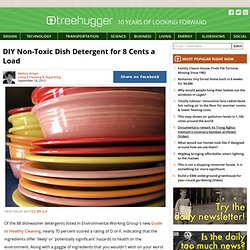
Homemade Borax-Free Dishwasher Detergent. Scientific consensus has gotten a bad reputation—and it doesn’t deserve it. One of the many unfortunate aspects of arguments over climate change is that it's where many people come across the idea of a scientific consensus.

Just as unfortunately, their first exposure tends to be in the form of shouted sound bites: "But there's a consensus! " "Consensus has no place in science! " Lost in the shouting is the fact that consensus plays several key roles in the process of science. In light of all the consensus choruses, it's probably time to step back and examine its importance and why it's a central part of the scientific process. And only after that is it possible to take a look at consensus and climate change. Standards of evidence Fiction author Michael Crichton probably started the backlash against the idea of consensus in science. Let's be clear: the work of science has nothing whatever to do with consensus. Reproducible results are absolutely relevant. While that makes the standards of evidence sound completely rational, they're also deeply empirical. S Guide to Healthy Cleaning. EWG to Remove Certification Score Boost Date posted: 2019-02-15.

Miscellaneous Bulk Ingredients – Mountain Rose Herbs. Borax: Not the green alternative it's cracked up to be. Thursday, February 17, 2011.
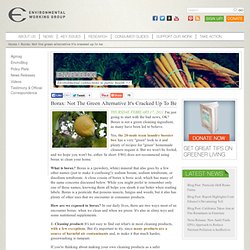
67 Homemade, All-Natural Cleaning Recipes. Potassium carbonate. Potassium carbonate (K2CO3) is a white salt, soluble in water (insoluble in ethanol[2]), which forms a strongly alkaline solution.
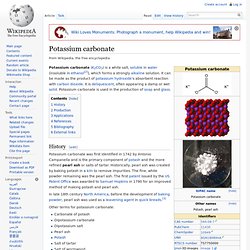
It can be made as the product of potassium hydroxide's absorbent reaction with carbon dioxide. Sodium carbonate. It most commonly occurs as a crystalline decahydrate, which readily effloresces to form a white powder, the monohydrate.
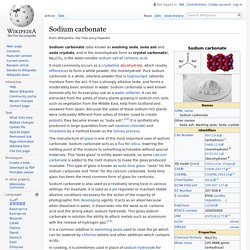
Pure sodium carbonate is a white, odorless powder that is hygroscopic (absorbs moisture from the air). It has a strongly alkaline taste, and forms a moderately basic solution in water. Sodium carbonate is well known domestically for its everyday use as a water softener. It can be extracted from the ashes of many plants growing in sodium-rich soils, such as vegetation from the Middle East, kelp from Scotland and seaweed from Spain.
Because the ashes of these sodium-rich plants were noticeably different from ashes of timber (used to create potash), they became known as "soda ash".[12] It is synthetically produced in large quantities from salt (sodium chloride) and limestone by a method known as the Solvay process. It is a common additive in swimming pools used to raise the ph which can be lowered by chlorine tablets and other additives which contains acids. Mining[edit] 7 uses for diatomaceous earth. Borax. In artisanal gold mining, the borax method is sometimes used as a substitute for toxic mercury in the gold extraction process. Borax was reportedly used by gold miners in parts of the Philippines in the 1900s.[2]
Avoid borax in your green cleaning products. Many MNNers already shun conventional cleaning products, most of which contain unnecessarily harsh and potentially harmful chemicals that are undisclosed on the ingredient list, if a list’s even provided. Instead, green cleaning advocates often mix their own DIY cleaning products from safer ingredients like lemon juice, vinegar, baking soda and borax. If you use all four of the ingredients I just mentioned above, I’ve got bad news. Borax isn’t so green and healthy, according to the well-respected environmental health nonprofit, Environmental Working Group. Borax: Not the green alternative it's cracked up to be. DIY Laundry Soap at 20 Cents a Gallon, But Is DIY Always Green? Image credit: Urban Farming Guys I've written before about the green benefits inherent in DIY, but that doesn't mean that everything DIY is green.
Take this latest video from the inspiring Urban Farming Guys—the same folks who gave us videos on DIY biogas and homemade goat milking stands—which shows us how to make insanely cheap laundry detergent from commonly available ingredients. Homemade Borax-Free Dishwasher Detergent. REACH for Greener Chemistry.